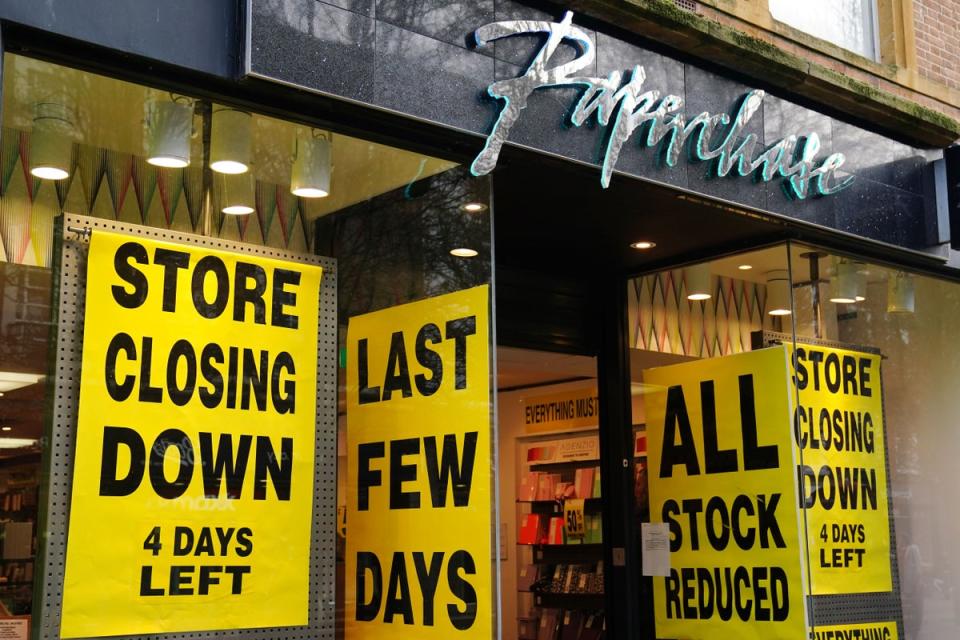What next for the Paperchase store estate as retailer adds to long list of empty shop spaces?

On a chilly day this week at a Enfield shopping centre there were plenty of clothing retailers to visit, but there was one large vacant shop with a “unit to let” sign in the window. This space was once home to a buzzing north London Topshop branch popular with local fashion-loving millennials, and new data shows it is just one of hundreds of stores in Great Britain currently empty following three high-profile retail casualties.
The latest figures could send a shiver down the spines of some Paperchase landlords preparing for the stationery retailer to exit 106 stores and concessions within the next two months, resulting in the loss of 900 jobs.
Research compiled for the Evening Standard by the The Local Data Company found 19 out of 167 BHS stores are not reopened, 59% (262) of Topshop owner Arcadia’s 441 sites are empty, and nearly half (48.5%) of Debenhams’ 169 shops are still vacant. Those retail businesses respectively shut their doors for the last time in 2016 and 2021.
Hayley Kennedy, analyst at The Local Data Company, says: “Due to the prime location of many of these stores on High Streets and in shopping centres, these units are often subject to higher operational costs, meaning historically many smaller brands and independent retailers have been priced out of taking on these sites.
“When combined with the effects of Covid, where brands have been reluctant to expand due to unstable trading conditions, the supply of unused units has outstripped demand, resulting in rising vacancy.”
Back to Paperchase, and the brand name was bought out of administration by Tesco in January, but not the shops in the UK and Ireland. Retail commentators are now looking at what will become of the sites, a host of which are in London, and which businesses, if any, they could appeal to.
One factor building owners could be thankful for is that the sizes are significantly smaller than department stores, some of which are being redeveloped into homes. That hopefully means less rental income is lost if they are vacant, and there is optimism some potential replacement tenants would view the space as less risky than taking on a huge property.
Zoe Mills, analyst at research firm GlobalData, still thinks finding new occupants will be “difficult”. She adds: “Indeed, even in high footfall locations such as transport hubs retailers are tentative about store expansion amid the cost-of-living crisis.”
But while some companies are waiting to see if consumer finances improve before investing in new bricks and mortar sites, there are others impressed by domestic and tourist footfall bouncing back from the pandemic.
Firms looking to expand include beauty retailer Space NK, which is seeking at least four more openings in 2023, and at the Westfield London centre make-up and skincare retailer Sephora has this week opened a shop.
The retail sector has shed 15,000 jobs since New Year’s Day
The British Property Federation’s Dominic Curran
Rival brands could also want to swoop on certain branches, according to Paul Marshall. He is head of UK retail at property consultancy JLL, which is marketing some of the Paperchase shops for landlords, and says: “We have multiple offers for the majority of Paperchase units we are marketing, often on improved rental levels to Paperchase. Demand is good either from card competitors who can reuse the existing fit-out or other expanding brands.”
Marshall says: “Generally despite some of the heavily reported consumer headwinds retailer occupier demand for this size of unit is remaining relatively resilient.”
Meanwhile Ted Schama, joint managing director of hospitality leasing agency Shelley Sandzer, predicts some upmarket fast food chains and coffee companies could eye the space. “While unfortunate, the disappearance of Paperchase from UK high streets is creating opportunities in prime locations for a wave of expanding food-led brands,” he says.
But even if Paperchase shops do quickly get picked up, there will still be many other empty stores elsewhere. Dominic Curran, associate policy director at the British Property Federation, warns: “The retail sector has shed 15,000 jobs since New Year’s Day and we are likely to see more stores close and gaps on High Streets.”
April’s business rates revaluation will lower bills for some retailers, but Curran thinks for many the level of tax “is still unsustainable” and disincentivises businesses to trade from stores. He wants further reforms to business rates.
Any more retail collapses in the coming months will certainly send a chill wind through the High Street, but there are businesses ready to fill in at least some of the upcoming gaps.

 Yahoo Finance
Yahoo Finance 